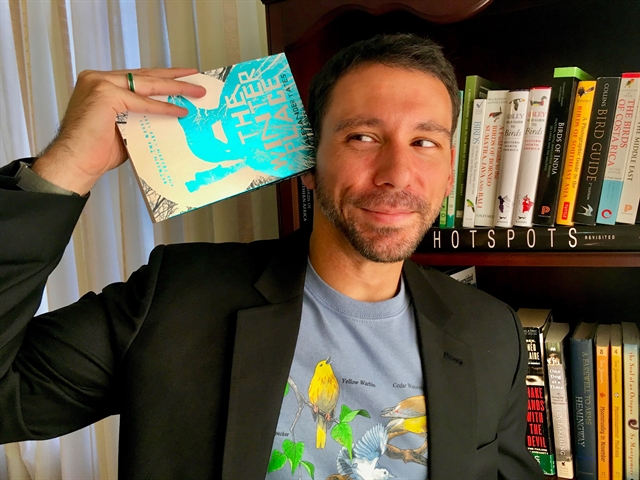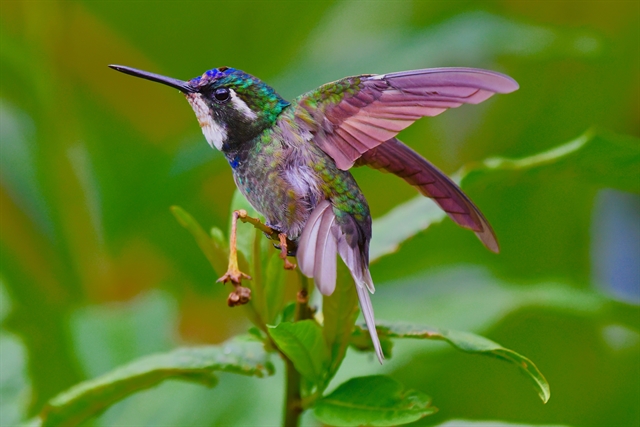
US novelist Alexander Yates poses with one of his books. He has lived in Hà Nội for about four years. — Photos courtesy of Yates
As the son of diplomats, American novelist Alexander Yates has travelled to 70 countries around the world.
He says one place was unlike any other, the place he now calls home: Việt Nam.
Yates has lived in Hà Nội for four years and apart from writing and promoting his books, spends his time as a partner in Fourdozen, an American-based education consultancy and marketing company and giving lectures and discussions on story-telling hosted by American Centre in the capital.
He was born in Haiti, and grew up in South America and the Philippines. He also worked as a consultant for the State Department and US Agency for International Development in Rwanda and Afghanistan.
Yates' first novel was published before he was 30. He has written one novel for adults, and two for young adults. The latest one, How We Became Wicked, came out in July.
The American has won awards in both fiction and poetry, and his books have been published in more than six countries.
“While all of the novels are very different from each other, they all deal with culture and identity,” he said.
“The question of where I am determines who I am and informs all of my books. Family issues, particularly relationships between parents and children, are also central to my work.”

A photo of a hummingbird in Costa Rica taken by Alexander Yates.
Special connection to Việt Nam
Yates first came to Việt Nam in 2014 and soon realised that he had never experienced anything like the country.
“I felt simultaneously very far from my own comfort zone, but also safe and welcomed. Particularly after my Vietnamese started to improve, I found it so rewarding to make relationships here.
“Speaking Vietnamese and getting to know the city of Hà Nội and its people has been one of the most meaningful experiences of my life,” he said.
Yates professes he has a deep love for Việt Nam and is a fan of how comfortable Vietnamese people are making one-on-one connections.
“I also love the use of public space in Hà Nội. The fact that Hà Nội is not for me, not for tourists or people with money. Hà Nội is for Hanoians. I am welcomed, but I am not necessary. I adore that.
“I also love the energy of Hà Nội, and of Việt Nam. There is such a sense of possibility here.”
Yates wants to do his best to adopt the local culture and lifestyle so he speaks Vietnamese every day in his office.
“It was naturally difficult to learn, but Hanoians are so willing to engage and correct me,” said Yates.
“In my early days learning Vietnamese, everyone I met was willing to become a teacher, and correct my word choice or pronunciation, I don’t feel ashamed at all.”
Bird-watching, more than a hobby
Yates' hobby of bird-watching has taken him all across the country and his photos of the avian delights are impressive, as is his passion.
“Bird-watching is a passion of mine. Do not ask me about it at a party, because I become like an evangelist spreading the gospel,” he said.
Yates has been watching and photographing birds for about 13 years and says he has seen about one fourth of all the bird species in the world so far.
“Some days I think I would like to go for the world record, but I doubt I will ever have the time and money to do all that travel, and also I am not sure I'm crazy enough. I'll settle for seeing half of the world's birds.”
Bird-watching is also a fantastic way to travel. For example, when he was bird-watching in shrimp farms in the northern province of Nam Định, looking for the endangered Black-Faced Spoonbill, he stopped for tea and spoke with many shrimp farmers.
“One year, I spent Tết in a stilt house over a lake filled with crocodiles in Cát Tiên National Park (the southern province of Đồng Nai),” he said.
“The forest rangers still had duty, but their families had brought them all food and beer to celebrate the holiday. So we celebrated together, in the woods, in the dark. It was a wonderful way to bring in the new year.”
For Yates, bird-watching is the ultimate meditation. He silently and patiently pays attention to the birds and photographs them.
“I take photos as a way to help me identify the birds, I know that my photos can never truly express how beautiful birds are,” he said.
“When I am in the woods, seeking a rare bird, my self disappears. I don't think at all about the troubles in my life, or stresses related to work. I focus completely on the sights and sounds coming in to me. My mind disappears, and I become nothing but a set of eyes watching, ears listening, and a beating heart, swelling.”
While Yates is a pet-lover, he doesn't keep caged birds as he wants to let them roam free and find their own homes, as he has in Việt Nam. — VNS
OVietnam